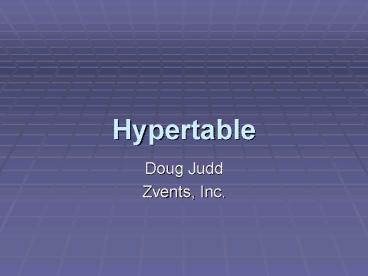Hypertable - PowerPoint PPT Presentation
1 / 37
Title: Hypertable
1
Hypertable
- Doug Judd
- Zvents, Inc.
2
Background
3
Web 2.0 Data Explosion
Web 2.0
Web 1.0
Web 2.0
Web 1.0
4
Traditional ToolsDont Scale Well
- Designed for a single machine
- Typical scaling solutions
- ad-hoc
- manual/static resource allocation
5
The Google Stack
- Google File System (GFS)
- Map-reduce
- Bigtable
6
Architectural Overview
7
What is Hypertable?
- A open source high performance, scalable
database, modelled after Google's Bigtable - Not relational
- Does not support transactions
8
Hypertable Improvements Over Traditional RDBMS
- Scalable
- High random insert, update, and delete rate
9
Data Model
- Sparse, two-dimensional table with cell versions
- Cells are identified by a 4-part key
- Row
- Column Family
- Column Qualifier
- Timestamp
10
Table Visual Representation
11
Table Actual Representation
12
Anatomy of a Key
- Row key is \0 terminated
- Column Family is represented with 1 byte
- Column qualifier is \0 terminated
- Timestamp is stored big-endian ones-compliment
13
Concurrency
- Bigtable uses copy-on-write
- Hypertable uses a form of MVCC(multi-version
concurrency control) - Deletes are carried out by inserting delete
records
14
CellStore
- Sequence of 65K blocks of compressed key/value
pairs
15
System Overview
16
Range Server
- Manages ranges of table data
- Caches updates in memory (CellCache)
- Periodically spills (compacts) cached updates to
disk (CellStore)
17
Client API
class Client void create_table(const String
name, const String
schema) Table open_table(const String
name) String get_schema(const String
name) void get_tables(vectorltStringgt
tables) void drop_table(const String name,
bool if_exists)
18
Client API (cont.)
class Table TableMutator create_mutator()
TableScanner create_scanner(ScanSpec
scan_spec) class TableMutator void
set(KeySpec key, const void value, int
value_len) void set_delete(KeySpec key)
void flush() class TableScanner bool
next(CellT cell)
19
Language Bindings
- Currently C only
- Thrift Broker
20
Write Ahead Commit Log
- Persists all modifications (inserts and deletes)
- Written into underlying DFS
21
Range Meta-Operation Log
- Facilitates Range meta operation
- Loads
- Splits
- Moves
- Part of Master and RangeServer
- Ensures Range state and location consistency
22
Compression
- Cell Stores store compressed blocks of key/value
pairs - Commit Log stores compressed blocks of updates
- Supported Compression Schemes
- zlib (--best and --fast)
- lzo
- quicklz
- bmz
- none
23
Caching
- Block Cache
- Caches CellStore blocks
- Blocks are cached uncompressed
- Query Cache
- Caches query results
- TBD
24
Bloom Filter
- Negative Cache
- Probabilistic data structure
- Indicates if key is not present
25
Scaling (part I)
26
Scaling (part II)
27
Scaling (part III)
28
Access Groups
- Provides control of physical data layout --
hybrid row/column oriented - Improves performance by minimizing I/OCREATE
TABLE crawldb Title MAX_VERSIONS3, Content
MAX_VERSIONS3, PageRank MAX_VERSIONS10,
ClickRank MAX_VERSIONS10, ACCESS GROUP default
(Title, Content), ACCESS GROUP ranking
(PageRank, ClickRank)
29
Filesystem Broker Architecture
- Hypertable can run on top of any distributed
filesystem (e.g. Hadoop, KFS, etc.)
30
Keys To Performance
- C
- Asynchronous communication
31
C vs. Java
- Hypertable is CPU intensive
- Manages large in-memory key/value map
- Alternate compression codecs (e.g. BMZ)
- Hypertable is memory intensive
- Java uses 2-3 times the amount of memory to
manage large in-memory map (e.g. TreeMap) - Poor processor cache performance
32
Performance Test(AOL Query Logs)
- 75,274,825 inserted cells
- 8 node cluster
- 1 1.8 GHz Dual-core Opteron
- 4 GB RAM
- 3 x 7200 RPM SATA drives
- Average row key 7 bytes
- Average value 15 bytes
- Replication factor 3
- 4 simultaneous insert clients
- 500K random inserts/s
- 680K scanned cells/s
33
Performance Test II
- Simulated AOL query log data
- 1TB data
- 9 node cluster
- 1 2.33 GHz quad-core Intel
- 16 GB RAM
- 3 x 7200 RPM SATA drives
- Average row key 9 bytes
- Average value 18 bytes
- Replication factor 3
- 4 simultaneous insert clients
- Over 1M random inserts/s (sustained)
34
Weaknesses
- Range data managed by a single range server
- Though no data loss, can cause periods of
unavailability - Can be mitigated with client-side cache or
memcached
35
Project Status
- Currently in alpha
- Just released version 0.9.0.7
- Will release beta version end of August
- Waiting on Hadoop JIRA 1700
36
License
- GPL 2.0
- Why not Apache?
37
Questions?
- www.hypertable.org































